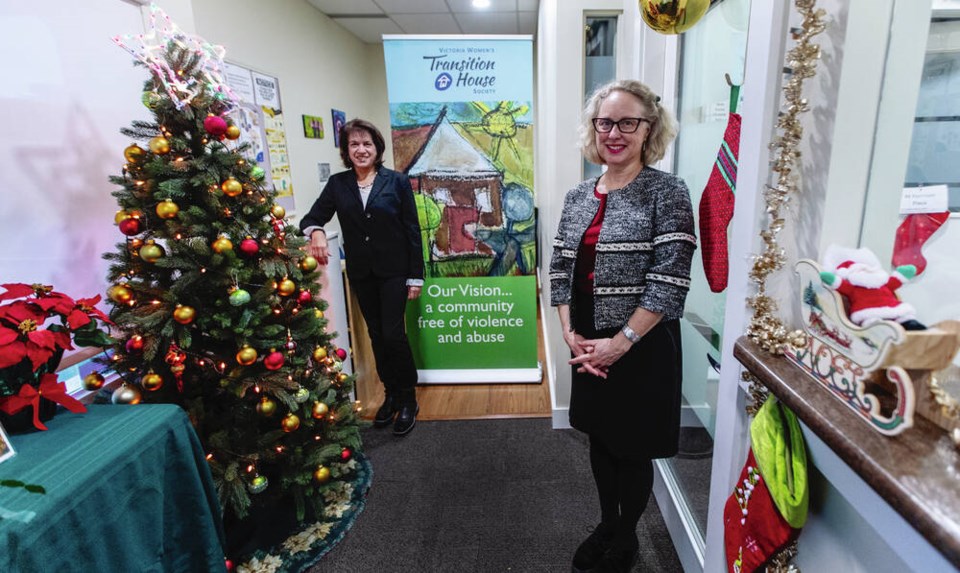“Best Christmas ever,” he said with a grin to his mom.
Other Christmases in his short life had been marred by fear and chaos. But that year, his fractured family celebrated with a hamper bursting with gifts, a delicious dinner and a safe place to rest his head — all made possible by a community that cares.
“There’s no trauma. No violence. The shelter is very secure and safe and it’s a warm welcoming environment,” said Susan Howard, development and communications director of the Victoria Women’s Transition House Society.
Women in abusive relationships are often reluctant to leave the family home around Christmas, afraid that their children will be left with unhappy memories, said Howard. But the reverse is often true.
“It’s good to get the word out for any woman who is thinking of leaving her partner in this pre-holiday time-frame. Resources are available and we have a 24-hour crisis and information line. Women can call and find out if there’s space at the shelter, find out the resources available. We can help them build a safety plan, so if and when they decide to leave, they do it in a safe way.”
This year, as it has in the past, donations from the will help bring comfort to women escaping violence who are seeking a better life and a safe home for their families.
And the need is greater than ever.
During the first year of the pandemic, from April 1, 2020, to March 31, 2021, the crisis line saw a 30 per cent increase in the number of calls for help. Volunteers and staff responded to more than 3,000 calls, many of which were lengthy and complicated, said Howard.
Domestic violence is a massive problem in the community, said Sgt. Mike Darling, who is in charge of the regional domestic violence unit. In the early months of 2021, officers saw a big increase in the number of cases.
“We couldn’t keep up with the number of referrals we were getting,” said Darling. “And the files we have are of increased severity. Almost all involved strangulation.”
The World Health Organization estimates that one in three women experiences sexual or physical violence, mostly by an intimate partner. During the last year, WHO estimates that 243 million women and girls around the world were abused by an intimate partner, said Darling.
“And they’re saying that fewer than 40 per cent seek help. I would say it’s probably far less than that,” he said. “When we look at the data on sexual assaults being reported, I don’t know why this would be any different.”
Transition House has two emergency shelters. The first is a house with eight bedrooms with 18 beds for women and children. It’s not running to capacity right now because of COVID health and safety protocols, said Howard. The second shelter can accommodate 30 women and children.
Women can stay for 30 days at the shelter, where they are provided with crisis counseling, family-law advocacy programs to help them obtain legal support, and financial assistance. Women are taken to appointments and provided with child care, said Howard. Their meals, hygiene supplies and bedding are provided by Transition House.
Almost from the moment they arrive, women are encouraged by housing outreach workers to start looking for housing.
“It’s so difficult and so expensive to find affordable housing,” said Howard. “Because it is so difficult, many of them go back to their abusive partners because they have nowhere else to go. But we’re a non-judgmental service. A woman can come back to get services from Transition House to access the shelter as many times as she needs. As long as we have room, we welcome her back.”
Money donated by the Christmas Fund goes “to the area of greatest need,” said Howard.
Transition House has used the money to hire a food security project co-ordinator, who collects and quickly distributes perishable items donated by grocery stories and local farms. It also helps pay for a Christmas dinner.
People today are much more aware of the issues surrounding domestic violence and the long and short-term effect on women and children who witness violence , said Parm Kroad, deputy director of Transition House.
“And that awareness has really helped us,” said Kroad. “The community has really come together. There’s been a huge increase in the support for our women.”
“That means a lot,” said Howard.
HOW TO DONATE
You can donate by going to the . The site is open 24 hours a day and provides an immediate tax receipt.
Or mail a cheque to the Times 91原创 Christmas Fund, 201-655 Tyee Road, Victoria, B.C. V9A 6X5.
You can also use your credit card by phoning 250-995-4438 from 9 a.m. to 1 p.m. Monday through Friday.



